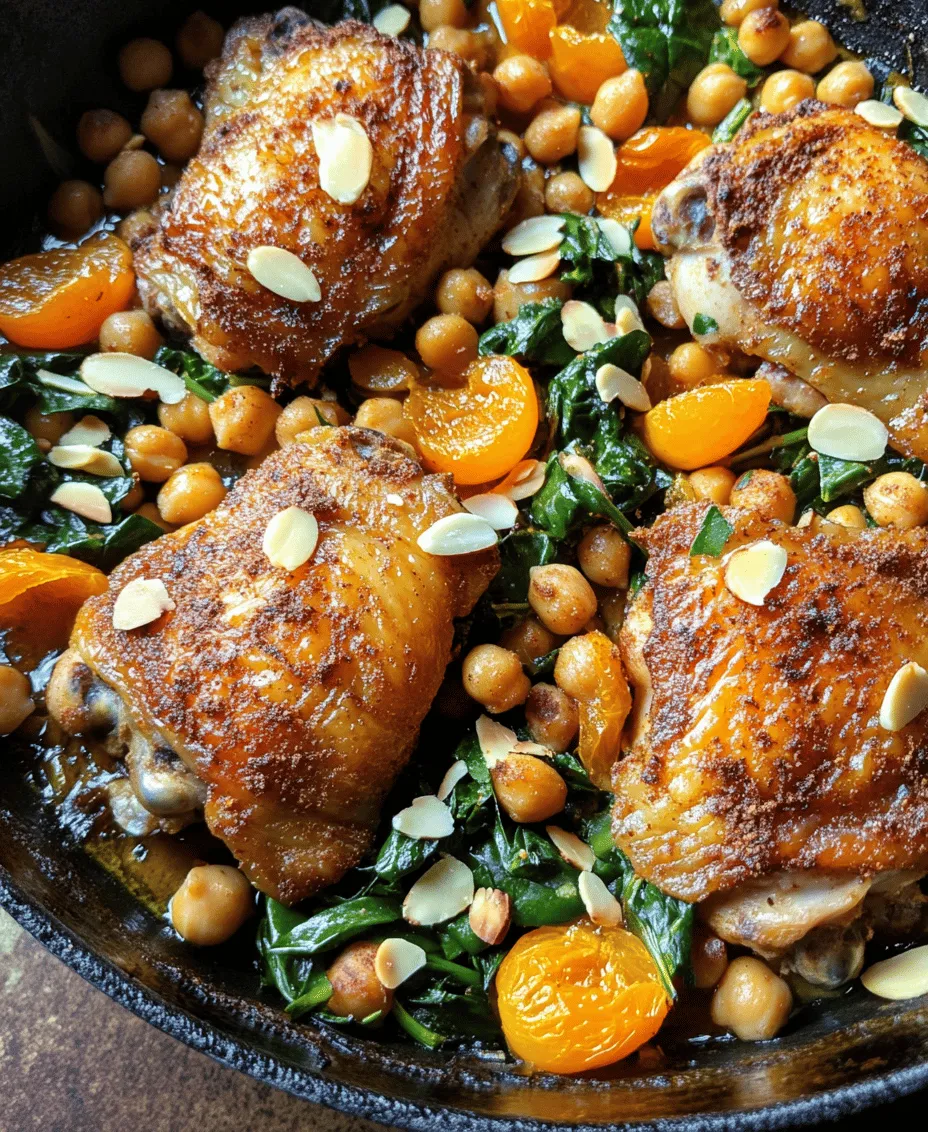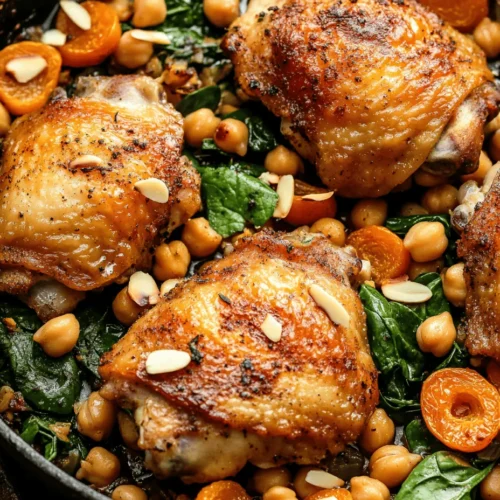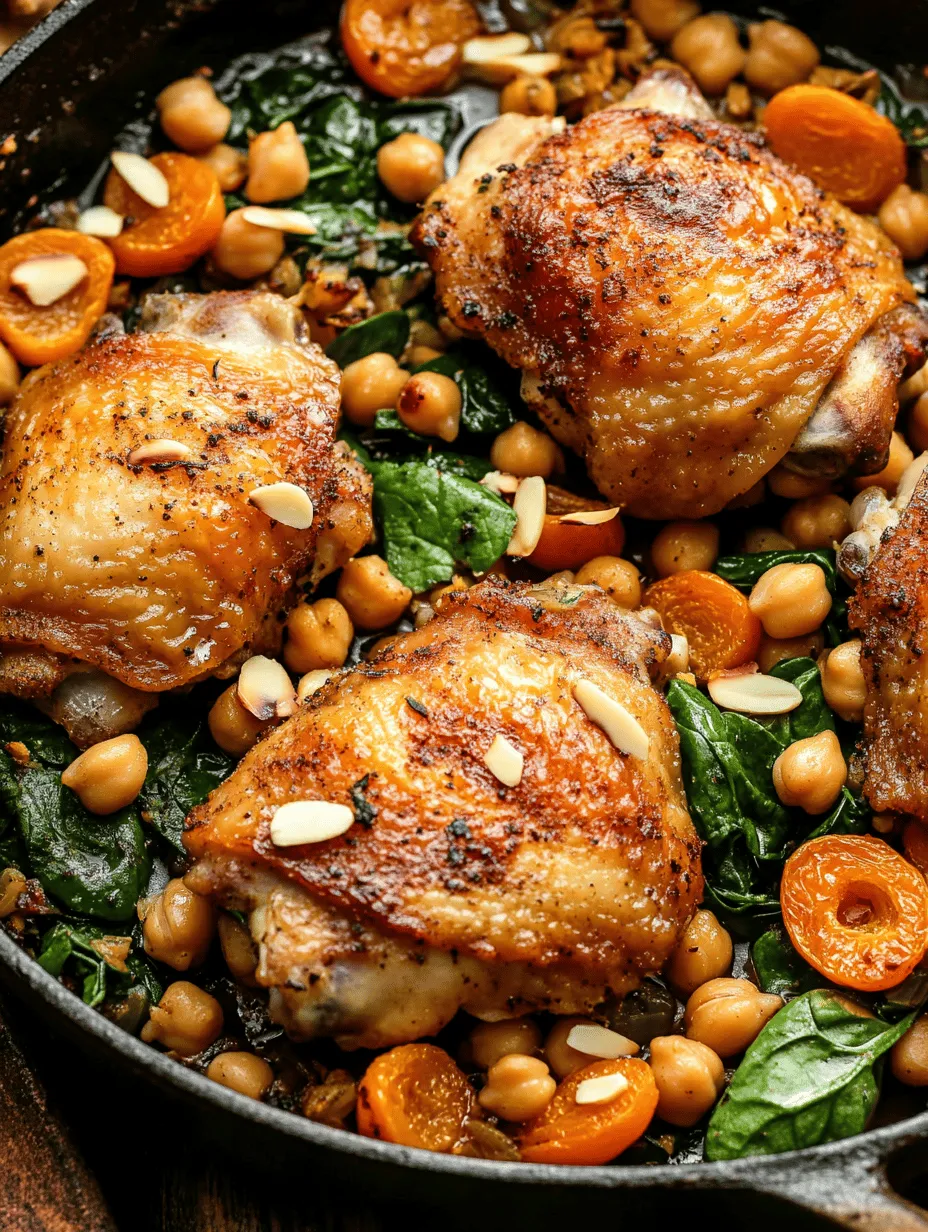Moroccan cuisine is a vibrant tapestry of flavors, aromas, and textures that reflects the country’s rich history and diverse cultural influences. At the heart of this culinary tradition is a unique blend of spices that not only tantalizes the taste buds but also tells a story of the land from which it originates. One dish that epitomizes the essence of Moroccan cooking is Moroccan Spiced Chicken. This dish is more than just a meal; it’s a culinary adventure that brings the warmth and comfort of Moroccan hospitality right to your dining table.
Moroccan Spiced Chicken is celebrated for its enchanting aroma and colorful presentation, making it an ideal centerpiece for family gatherings and special occasions. The dish features succulent chicken thighs marinated in a harmonious mix of spices, resulting in tender meat that is bursting with flavor. As you prepare this dish, you’ll be captivated by the aromatic spices wafting through your kitchen, inviting everyone to gather and share in the experience. The vibrant colors of the spices, combined with fresh herbs and vegetables, create a feast for the eyes as well as the palate.
Understanding the Ingredients
To truly appreciate the depth of flavor in Moroccan Spiced Chicken, it’s essential to understand the ingredients that contribute to its distinctive profile. Each component plays a significant role in creating a dish that is both delicious and nourishing.
The Role of Chicken Thighs
When it comes to choosing the right cut of chicken for this recipe, bone-in, skin-on chicken thighs are the optimal choice. Unlike chicken breasts, which can dry out during cooking, chicken thighs are known for their juiciness and rich flavor. The bone helps to retain moisture, ensuring that each bite is tender and succulent. Additionally, the skin adds a delightful crispiness when roasted, enhancing the overall texture of the dish. This combination of tenderness and flavor makes chicken thighs the star of Moroccan Spiced Chicken.
The Spice Blend
The true magic of Moroccan Spiced Chicken lies in its spice blend. This combination of spices not only defines the dish but also reflects the essence of Moroccan cuisine. Here’s a closer look at each spice and its significance:
– Cumin: Known for its warm, earthy flavor, cumin is a staple in Moroccan cooking. It aids in digestion and adds a depth of flavor to the chicken.
– Coriander: With its bright, citrusy notes, coriander complements the richness of the chicken. It is also known for its anti-inflammatory properties.
– Paprika: Adding a subtle smokiness and vibrant color, paprika is essential in creating the dish’s visually appealing presentation. It’s rich in antioxidants and enhances the overall flavor profile.
– Cinnamon: This sweet spice brings warmth to the dish and is often used in Moroccan cooking to balance savory flavors. Cinnamon is also known for its potential health benefits, including blood sugar regulation.
– Ginger: Fresh ginger adds a zesty kick and pairs beautifully with the other spices. It’s known for its digestive benefits and anti-inflammatory properties.
– Cayenne: For those who enjoy a bit of heat, cayenne pepper adds a spicy kick that enhances the dish without overwhelming the palate.
Together, these spices create a rich and complex flavor that is characteristic of Moroccan cuisine. They also offer various health benefits, making this dish not only delicious but also nourishing.
The Importance of Fresh Ingredients
While the spice blend is crucial, the use of fresh ingredients takes this dish to the next level. Fresh garlic, lemon juice, and greens like spinach contribute to the overall flavor enhancement and nutritional value of the Moroccan Spiced Chicken.
– Garlic: Known for its bold flavor and numerous health benefits, garlic adds a pungent kick to the marinade. It is rich in antioxidants and has been linked to improved heart health.
– Lemon Juice: The acidity of fresh lemon juice brightens the dish and balances the richness of the chicken. It also aids in tenderizing the meat, making it even more succulent.
– Fresh Spinach: Spinach not only adds a pop of color but also provides essential vitamins and minerals. It complements the dish’s flavors and makes it more nutritious.
– Herbs: Fresh herbs like cilantro and parsley are often used as garnishes or mixed into the marinade. They add freshness and a burst of flavor that elevates the overall dish.
Incorporating these fresh ingredients ensures that your Moroccan Spiced Chicken is not only delicious but also packed with nutrients, making it a well-rounded meal.
Step-by-Step Preparation of Moroccan Spiced Chicken
Now that we have a solid understanding of the key ingredients, let’s delve into the preparation process for Moroccan Spiced Chicken. This step-by-step guide will help you create a dish that is bursting with flavor and sure to impress.
Creating the Marinade
The first step in preparing Moroccan Spiced Chicken is to create the marinade. Marinating the chicken is essential as it allows the flavors to penetrate the meat, resulting in a more flavorful dish. Here’s how to create a robust marinade:
1. Gather Your Ingredients: Start by measuring out the spices—cumin, coriander, paprika, cinnamon, ginger, and cayenne. You’ll also need minced garlic, fresh lemon juice, olive oil, and salt.
2. Combine the Dry Ingredients: In a mixing bowl, combine the cumin, coriander, paprika, cinnamon, ginger, and cayenne. Whisk these spices together until well blended.
3. Add Wet Ingredients: To the bowl of dry spices, add minced garlic, fresh lemon juice, and olive oil. The olive oil serves as a base for the marinade, helping the spices adhere to the chicken while keeping it moist.
4. Season the Marinade: Add salt to taste, ensuring that the marinade is well-seasoned. This step is crucial as it enhances the overall flavor of the chicken.
5. Mix Thoroughly: Use a whisk or a fork to combine all the ingredients until smooth. The result should be a thick, aromatic paste that will coat the chicken evenly.
Marinating the Chicken
Once your marinade is ready, it’s time to marinate the chicken thighs. This step is key to achieving maximum flavor and tenderness.
1. Prepare the Chicken: Rinse the chicken thighs under cold water and pat them dry with paper towels. Removing excess moisture helps the marinade adhere better.
2. Coat the Chicken: In a large mixing bowl or a resealable plastic bag, add the chicken thighs. Pour the marinade over the chicken, ensuring that each piece is generously coated. If using a bowl, you can use your hands to massage the marinade into the chicken for even distribution.
3. Seal and Refrigerate: If using a plastic bag, seal it tightly, removing as much air as possible. For a bowl, cover it with plastic wrap. Place the marinating chicken in the refrigerator for at least 1 hour, but for best results, aim for 4 to 8 hours. This allows the flavors to meld and infuse into the chicken.
4. Bring to Room Temperature: Before cooking, remove the chicken from the refrigerator and let it sit at room temperature for about 30 minutes. This helps ensure even cooking.
5. Preheat Your Oven: While the chicken is coming to room temperature, preheat your oven to 425°F (220°C). A hot oven will help achieve crispy skin while keeping the chicken juicy.
By following these initial steps, you’re well on your way to creating a delicious Moroccan Spiced Chicken that is sure to impress your family and friends. The combination of spices, fresh ingredients, and careful preparation will set the stage for a truly memorable dining experience. Stay tuned for the next part of the recipe, where we’ll explore the cooking process and tips for serving this flavorful dish.

Optimal Marinating Time and Storage
Marinating is a crucial step in preparing Moroccan Spiced Chicken, as it allows the flavors to penetrate the meat, resulting in a tender and aromatic dish. For optimal results, marinate the chicken for at least 2 hours, although overnight is preferable. An extended marinating time lets the spices infuse deeply, enhancing the overall flavor profile. If time is of the essence, even a quick 30-minute marination can yield delicious results, but patience will reward you with a more robust taste.
When marinating, ensure the chicken is stored in an airtight container or a resealable plastic bag in the refrigerator. This not only prevents cross-contamination but also helps retain moisture within the chicken. If you have leftover marinated chicken, it can be refrigerated for up to 2 days. However, if you’ve already cooked the chicken, store any leftovers in an airtight container in the fridge, where it will last for about 3-4 days. You can also freeze cooked Moroccan Spiced Chicken for up to three months; just make sure to cool it completely before transferring it into freezer-safe containers.
Searing the Chicken
Searing the chicken is a vital step that creates a rich, golden crust while locking in moisture. Begin by preheating your oven to 375°F (190°C), and choose an oven-safe skillet, such as cast iron or stainless steel, to facilitate the transition from stovetop to oven.
Add a tablespoon of oil to the skillet over medium-high heat. As the oil shimmers, carefully place the marinated chicken skin-side down into the skillet. Avoid overcrowding the pan, as this can lower the temperature and result in uneven browning. Allow the chicken to sear for about 4-5 minutes, or until the skin is beautifully browned and releases easily from the pan. Gently flip the chicken and sear the other side for an additional 3-4 minutes. This step not only enhances flavor through the Maillard reaction but also creates a visually appealing presentation.
Incorporating the Broth and Other Ingredients
Once the chicken is nicely browned, it’s time to introduce the other ingredients that will elevate this dish. Pour in 1 cup of chicken broth—this will deglaze the skillet, lifting any flavorful bits stuck to the bottom. Next, add 1 can of drained chickpeas and 1 cup of chopped dried apricots. The chickpeas contribute protein and a hearty texture, while the dried apricots add a subtle sweetness that beautifully contrasts the spices.
Stir the mixture gently, ensuring the chicken is well-distributed among the chickpeas and apricots. The combination of these ingredients will create a flavorful sauce that will soak into the chicken during baking, making each bite a delightful explosion of flavor.
Baking to Perfection
Transfer the skillet to the preheated oven for baking. Bake the chicken for approximately 25-30 minutes or until the internal temperature reaches 165°F (75°C). Using a meat thermometer ensures that the chicken is cooked through without being dry.
In the last 5 minutes of baking, you can add a handful of fresh spinach to the skillet. This not only enhances the dish’s color but also adds nutritional value. The spinach will wilt quickly, integrating seamlessly into the sauce and providing a vibrant contrast to the other ingredients.
Serving Suggestions and Pairings
Moroccan Spiced Chicken can be served in numerous ways, making it versatile for any occasion. A traditional approach is to serve it atop a bed of fluffy couscous. The grains soak up the flavorful sauce, creating a fulfilling and hearty meal. Alternatively, consider serving it with steamed jasmine rice or quinoa for a gluten-free option.
For added texture and flavor, garnish the dish with fresh cilantro or parsley before serving. Accompany your meal with a simple green salad dressed with lemon juice and olive oil to provide a refreshing contrast to the rich spices. Additionally, consider some warm pita bread or flatbreads as a side, perfect for sopping up the sauce.
Nutritional Benefits of Moroccan Spiced Chicken
This dish is not only a feast for the senses but also offers numerous nutritional benefits. Chicken is an excellent source of lean protein, essential for muscle growth and repair. The addition of chickpeas not only provides protein but also adds dietary fiber, which promotes digestive health.
Dried apricots contribute beneficial nutrients such as vitamin A and potassium, while the spinach delivers iron, vitamins A, C, and K, and folate. The spices used—cumin, coriander, and cinnamon—are known for their anti-inflammatory and antioxidant properties, making this dish as healthy as it is delicious.
Cultural Significance of Moroccan Cuisine
Moroccan cuisine is a vibrant tapestry woven from a blend of cultural influences, including Berber, Arab, and Mediterranean traditions. Spices play an integral role in Moroccan cooking, where they are often used not only for flavor but also for their health benefits. The use of spices like saffron, cumin, and cinnamon in Moroccan dishes is a reflection of the country’s historical trade routes and agricultural diversity.
Mealtime in Morocco is often a communal experience, where families and friends gather around a shared platter, emphasizing togetherness and hospitality. The act of sharing food is not just about nourishment; it is a celebration of life, culture, and relationships. Dining is typically a slow affair, allowing time for conversation and connection, encapsulating the essence of Moroccan culture.
Conclusion: A Flavorful Journey with Moroccan Spiced Chicken
Moroccan Spiced Chicken is more than just a meal; it’s an invitation to explore the rich and diverse world of Moroccan culinary traditions. From the vibrant spices to the communal dining experience, this dish encapsulates the warmth and hospitality of Moroccan culture. The combination of tender chicken, hearty chickpeas, and sweet dried apricots creates a flavor profile that is both comforting and exotic.
As you embark on your culinary journey, let the vibrant flavors of Morocco inspire you in your kitchen. Embrace the joy of cooking and sharing good food, and allow Moroccan Spiced Chicken to transport you and your loved ones to a world rich in flavors and traditions. Whether it’s a family gathering or a cozy dinner for two, this dish promises to delight and satisfy.



